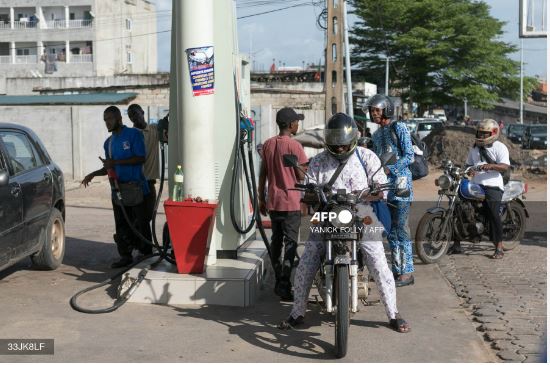In the bustling streets of Cotonou, Benin’s economic capital, Jeannine sits beside her stock of cheap gasoline in yellow jerry cans, but her customers are scarce. The motorbikes and cars that used to rely on her smuggled fuel from Nigeria no longer stop to replenish their tanks. Ever since Nigeria’s President Bola Ahmed Tinubu abruptly ended the longstanding fuel subsidy in his country, the prices of black market fuel in Benin have doubled.
Jeannine laments the decline in business, saying, “Since this morning, barely five people have stopped. Everyone prefers to go to the petrol station now.” Two weeks ago, the price of “Kpayo,” the smuggled gasoline sold on Beninese roads, doubled from 350 to 700 CFA francs (0.5 to 1 euro) per liter. This price now surpasses the market price of petrol in service stations, which is around 650 CFA francs per liter. In Nigeria, fuel prices have also tripled since the subsidy removal, leading to a ripple effect on food, transportation, and power prices.
Ending the subsidy was the initial action taken by President Tinubu, who views it as an unsustainable financial burden that costs the state billions of dollars annually and facilitates massive smuggling of subsidized gasoline to neighboring countries. Justifying his decision, which has been met with disapproval within Nigeria, Tinubu stated, “Why should we…feed the smugglers and be the Santa Claus of neighboring countries?”
For decades, Nigeria’s low-cost gasoline has been illicitly transported by road to its neighboring countries, particularly Benin, where it is resold on the black market by numerous informal sellers. Jeannine, a 48-year-old widow with five children, remarks, “You know, this fuel helps feed thousands of people in Benin.” She also expresses her inability to start a new business due to a lack of savings.
The scale of this fuel trafficking is so significant that taxi fares in Cotonou have nearly doubled. In Cameroon, another neighboring country of Nigeria, several motorcycle taxi unions have initiated strikes in protest. Victorien Assogba Kossi, a motorbike taxi driver, wonders about the situation in Nigeria and asks, “Is it because the border is closed?” He has never heard of Nigerian subsidies and hopes for a resolution, as his business slowdown has forced him to reduce his children’s corn rations.
While many suffer from the fuel subsidy removal, some individuals, like Nicolas Evedjere, the manager of a gas station, are experiencing a surge in business. Evedjere happily reports, “We had to close this morning because we had nothing left to sell. Our clients have multiplied by ten.” However, he also expresses sadness at seeing others endure hardships.
The spike in demand caught suppliers off guard, causing long queues to form at gas stations that still have fuel available during peak times. This episode of subsidy removal highlights Benin’s heavy reliance on its Nigerian neighbor, a West African powerhouse with a population of 215 million, the continent’s largest economy, and one of Africa’s leading oil producers.
In 2019, the border between Nigeria and Benin was abruptly closed by former Nigerian President Muhammadu Buhari, leading to an 18-month shutdown that severely impacted Benin’s economy. It is worth noting that Benin’s President Patrice Talon recently replaced his foreign affairs minister with Shegun Bakari, a Beninese entrepreneur who shares the same Yoruba ethnicity as Tinubu, the Nigerian president. Observers speculate that Bakari is “close” to Tinubu’s inner circle.
At the Seme-Krake border post, located on





